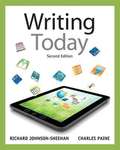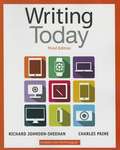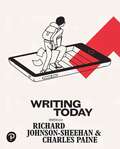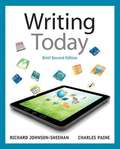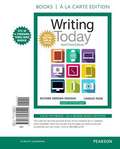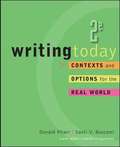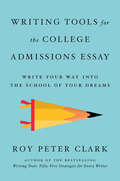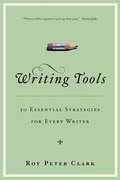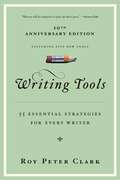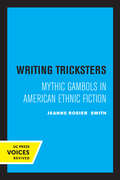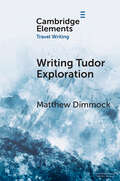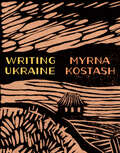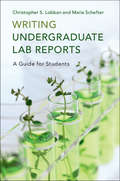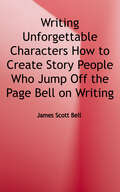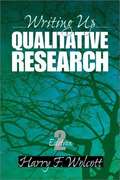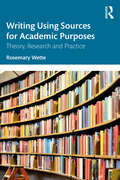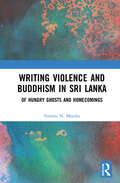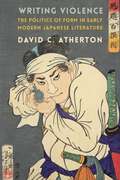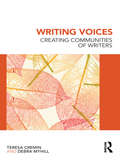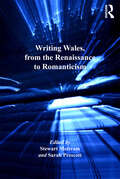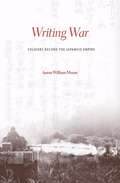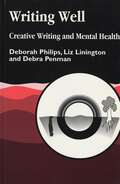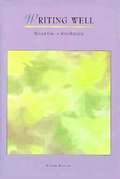- Table View
- List View
Writing Today
by Richard Johnson-Sheehan Charles PaineWith a clear and easy-to-read presentation, visual instruction and pedagogical support, Writing Today is a practical and useful guide to writing for college and beyond. This text teaches how to transfer their writing skills to careers. By teaching kinds of writing (analyses, reports, proposals, etc. ), strategies for writing (narration, comparison, argumentation, etc. ), and processes for writing (planning, drafting, revising, etc. ), Writing Today provides the writer with tools they can mix and match as needed to respond effectively to many writing situations.
Writing Today
by Richard Johnson-Sheehan Charles PaineAccessible to students and flexible for instructors, Writing Today, Third Edition introduces students to the conventions of writing memoirs, profiles, literary analyses, arguments, research papers, and more. Each chapter features a step-by-step process for composing within a given genre, as well as exemplary student and professional readings to promote rhetorical knowledge and critical analysis. The 42 short chapters, the chunked writing style, and visual instruction work to ensure that students will transfer the skills and strategies practiced in your class to their other classes, their lives, and their careers. From its graphic “Quick Start Guides” to its “Write This” prompts, Writing Today challenges students to extend the boundaries of their writing abilities as they practice composing for the real world.
Writing Today
by Johnson-Sheehan Richard Paine CharlesWriting Today provides you with practical writing skills for composing in the real world. This is an accessible text created with today's students in mind. It's chunked writing style, eye-catching design and focus on writing genres, strategies, and processes sets you up for success. You'll gain knowledge you can utilize in your college courses, your career, and your civic life. The 4th Edition marks a turning point in this highly successful series. Authors Richard Johnson-Sheehan and Charles Paine have made reflection, or discovering why we think the way we do, one of the central concepts of the revision. As you explore this theme, you'll build your intellect, become more aware, versatile, and resilient.
Writing Today (Brief Edition)
by Richard Johnson-Sheehan Charles PaineWith a clear and easy-to-read presentation, visual instruction and pedagogical support, Writing Today is a practical and useful guide to writing for college and beyond. This text teaches how to transfer their writing skills to careers. By teaching kinds of writing (analyses, reports, proposals, etc. ), strategies for writing (narration, comparison, argumentation, etc. ), and processes for writing (planning, drafting, revising, etc. ), Writing Today provides the writer with tools they can mix and match as needed to respond effectively to many writing situations.
Writing Today (Brief Third Edition)
by Richard Johnson-Sheehan Charles PaineThis version of Writing Today, Brief Edition has been updated to reflect the 8th edition of the MLA Handbook (April 2016). The 8th edition introduces sweeping changes to the philosophy and details of MLA works cited entries. Responding to the “increasing mobility of texts,” MLA now encourages writers to focus on the process of crafting the citation, beginning with the same questions for any source. These changes, then, align with current best practices in the teaching of writing which privilege inquiry and critical thinking over rote recall and rule-following. <p><p> Accessible to students and flexible for instructors, Writing Today, Brief Edition, Third Edition introduces students to the conventions of writing memoirs, profiles, literary analyses, arguments, research papers, and more. Each chapter features a step-by-step process for composing within a given genre, as well as exemplary student and professional readings to promote rhetorical knowledge and critical analysis. The 32 short chapters, the chunked writing style, and visual instruction work to ensure that students will transfer the skills and strategies practiced in your class to their other classes, their lives, and their careers. From its graphic “Quick Start Guides” to its “Write This” prompts, Writing Today, Brief Edition challenges students to extend the boundaries of their writing abilities as they practice composing for the real world.
Writing Today: Contexts and Options for the Real World (2nd edition)
by Donald Pharr Santi BuscemiWriting Today begins with a chapter helping students learn the skills they will need to thrive throughout college and continues to promote reading and writing as practical tools both in college and in the work world. Full chapters on Group Projects and Oral Presentations teach students how to not only be successful in the classroom, but in the world of work as well. Students are sure to be engaged as they focus on the both the academic and professional contexts of writing.
Writing Tools for the College Admissions Essay: Write Your Way into the School of Your Dreams
by Roy Peter ClarkThe essential guide to crafting the winning college admissions essay that only you could write, from America&’s favorite writing coach. Most high school students never have received any instruction in how to write a personal essay. Yet at a time when getting admitted to their dream college is more competitive than ever, the admissions essay may turn out to be the single most important thing they will ever write. The stakes are high. In Writing Tools for the College Essay, veteran journalist and writing coach Roy Peter Clark shows how any student can showcase their unique achievements, intellect, and attributes to stand out from the crowd. Packed with nearly two dozen remarkable essay examples and 100 digestible essay writing tips that students can carry with them throughout their careers, this is the essential guide every high school student, parent, and teacher needs. Readers will learn: How to select your writing prompt The key elements of a compelling story How to master the art of the riveting detail What it means to write with an authentic voice How to &“grab readers by the throat&” The power of reading one&’s work aloud The rules of honest writing (including whether to use AI tools) Tips for revising (and re-revising) your masterpiece and much more
Writing Tools: 50 Essential Strategies for Every Writer
by Roy Peter ClarkWriting Tools covers everything from the most basic tool to the more complex ones and provides more than 200 examples from literature and journalism to illustrate the concepts.
Writing Tools: 55 Essential Strategies for Every Writer
by Roy Peter ClarkOne of America's most influential writing teachers offers a toolbox from which writers of all kinds can draw practical inspiration."Writing is a craft you can learn," says Roy Peter Clark. "You need tools, not rules." His book distills decades of experience into 50 tools that will help any writer become more fluent and effective. WRITING TOOLS covers everything from the most basic ("Tool 5: Watch those adverbs") to the more complex ("Tool 34: Turn your notebook into a camera") and provides more than 200 examples from literature and journalism to illustrate the concepts. For students, aspiring novelists, and writers of memos, e-mails, PowerPoint presentations, and love letters, here are 50 indispensable, memorable, and usable tools. "Pull out a favorite novel or short story, and read it with the guidance of Clark's ideas. . . . Readers will find new worlds in familiar places. And writers will be inspired to pick up their pens." -Boston Globe"For all the aspiring writers out there-whether you're writing a novel or a technical report-a respected scholar pulls back the curtain on the art." -Atlanta Journal-Constitution"This is a useful tool for writers at all levels of experience, and it's entertainingly written, with plenty of helpful examples." -Booklist
Writing Tricksters: Mythic Gambols in American Ethnic Fiction
by Jeanne Rosier SmithWriting Tricksters examines the remarkable resurgence of tricksters—ubiquitous shape-shifters who dwell on borders, at crossroads, and between worlds—on the contemporary cultural and literary scene. Depicting a chaotic, multilingual world of colliding and overlapping cultures, many of America's most successful and important women writers are writing tricksters. Taking up works by Maxine Hong Kingston, Louise Erdrich, and Toni Morrison, Jeanne Rosier Smith accessibly weaves together current critical discourses on marginality, ethnicity, feminism, and folklore, illuminating a "trickster aesthetic" central to non-Western storytelling traditions and powerfully informing American literature today. This title is part of UC Press's Voices Revived program, which commemorates University of California Press’s mission to seek out and cultivate the brightest minds and give them voice, reach, and impact. Drawing on a backlist dating to 1893, Voices Revived makes high-quality, peer-reviewed scholarship accessible once again using print-on-demand technology. This title was originally published in 1997.
Writing Tudor Exploration: Richard Eden and West Africa (Elements in Travel Writing)
by Matthew DimmockRichard Eden's Decades has long been recognised as a landmark in the translation and circulation of information concerning the Americas in England. What is often overlooked in Eden's book is the presence of the first two Tudor voyage accounts to have been committed to print, assembled in haste and added late in the printing process. Both concern English commercial ventures to the West African coast, undertaken despite vehement Portuguese protests and in the midst of the profound alteration of the Marian succession. Both are complex, contradictory, and innovative experiments in generic form and content. This Element closely examines Eden's assembly and framing of these accounts, engaging with issues of material culture, travel writing, new knowledge, race, and the negotiation of political and religious change. In the process it repositions West Africa and Eden at the heart of a lost history of early English expansionism.
Writing Ukraine
by Myrna KostashMyrna Kostash’s term as writer in residence at Athabasca University began shortly after the escalation of the Russo-Ukrainian War in 2022. In this essay, based on her writer-in-residence lecture at Athabasca University, Kostash offers a self-critical reflection on her body of work and considers how her visits to Ukraine and the ongoing war have nuanced her writing about and understanding of Ukrainian Canadian identity.
Writing Undergraduate Lab Reports: A Guide for Students
by Lobban Christopher S. María SchefterWriting clear, impactful reports is a crucial skill for science students, but few books focus on this area for the undergraduate. Particularly useful for biology students, this text adopts a hands-on approach, using example reports and published papers as models to put guidance into practice. An introductory chapter familiarizes undergraduates with the principles of writing science. Two model reports are then developed, walking students through experimental and observational teaching-lab reports. The structure and content of the Introduction, Methods and Materials, Results, and Discussion are explained, together with tips for the title, abstract, and references. Students are then guided on how to polish their first draft. The last section of the book analyzes two published papers, helping the reader transition to reporting original research. Clearly and concisely written, this text offers a much-needed lifeline for science students facing science report-writing for the first time, and for those looking to hone their writing skills.
Writing Unemployment
by Jody MasonThis landmark study explores the cultural and literary history of unemployment in Canada from the 1920s to the 1970s, which were crucial decades in the formation of our current conception of Canada as a nation. Writing Unemployment asks how writers with diverse political affiliations participated in and protested against the discursive framing of unemployment. It argues that Depression-era conceptions of unemployment shaped later twentieth-century understandings of both worklessness and citizenship.By examining novels, short stories, poetry, manifestos, and agitprop, Jody Mason situates the literary history of the cultural left in a broader context, challenges the dominant literary-historical narrative of the pioneer settler, and contributes to new scholarship on Canada's modern period. By bridging close textual readings with book and publishing history, economic and sociological analysis, and original archival research, Writing Unemployment offers new ideas on work by many of Canada's most important writers.
Writing Unforgettable Characters: How to Create Story People Who Jump off the Page (Bell On Writing Ser. #Vol. 12)
by James Scott BellWhat will take your fiction from good to great? From decent to dazzling? From lackluster to blockbuster? Characters who "jump off the page." Of course plot matters. So does conflict, and scenes, and every other aspect of the fiction craft. But without unforgettable characters, your books will always be less than they could be. Don't let that happen. In this book, you'll learn: -How to lay the foundation for a memorable character -How to bond the reader with the main character from the start -The super power of unpredictability -The secrets of grit, wit, and moxie -How to bring your character to life on the page-How and when to reveal backstory -All about arcs and what they truly mean -The key to unforgettable villains-How to make minor characters memorable, too -How to create a great series character And more, PLUS the powerful exercises James Scott Bell has taught in his sold-out writing workshops. No more flat stories! Give your readers what will turn them into career-long fans-characters who jump off the page.
Writing Up Qualitative Research
by Harry F. WolcottThis author provides practical advice on how to write up research results gleaned from qualitative studies.
Writing Using Sources for Academic Purposes: Theory, Research and Practice
by Rosemary WetteWriting Using Sources for Academic Purposes: Theory, Research and Practice provides research-based information about key components of source-based writing, and the challenges it presents for novices. Proficiency in source-based writing is an essential and challenging goal for all inexperienced academic writers, from both L1 and L2 backgrounds. This comprehensive book presents an innovative, integrated approach for graduate students, teaching faculty, and practice-oriented researchers in ESP/EAP around the world. Each chapter includes suggestions and sample tasks for self-study or classroom use. Incorporating reviews of research and scholarly knowledge as well as information about likely challenges for novices, the book examines: (1) Changing views on the origins of novices’ difficulties (2) Pre-writing tasks that writers need to work through, from locating and evaluating sources to proficient reading-to-write and summarizing strategies (3) Citing types and purposes (4) The more sophisticated abilities of conveying an appropriate stance and engaging with readers (5) Disciplinary citing practices This book will be of interest to undergraduate and postgraduate writers from a variety of backgrounds, as well as their teachers and supervisors. It will be relevant to the growing number of researchers from non-English speaking backgrounds who are obliged to publish their work in English language international journals, and scholars who may be interested in carrying out research related to source-based writing.
Writing Violence and Buddhism in Sri Lanka: Of Hungry Ghosts and Homecomings
by Nimmi N. MenikeThis book examines the idea of violence in the context of religion and literature. It addresses the question of freedom and peace, and violence, with reference to the Buddhist nationalist discourse in Sri Lanka, against the backdrop of Shyam Selvadurai’s novel, The Hungry Ghosts. The book discusses love, compassion, emancipation, ethics and responsibility through the concepts of identity, deconstruction and decolonization to view religion as language or writing. With a blend of philosophical insights from Emmanuel Levinas, Jacques Derrida, Maurice Blanchot, and Mahatma Gandhi on ideas of being and the other, differences, nonviolence and forgiveness, it insists on the ethical exigency of reinventing Buddhism in Sri Lanka. Delving into some the central motifs of Selvadurai’s novel, suffering, desire, hate, and vengeance, it questions popular Sinhala Buddhist readings to argue for the promise of inclusive and diverse approaches towards various groups, linguistic communities, women, and homosexuality. This book will be useful for scholars and researchers of literature and languages, South Asian literature, literary criticism and theory, linguistics, cultural studies, philosophy, religion, Buddhist studies, diaspora studies, and Sri Lankan literature and sociology.
Writing Violence: The Politics of Form in Early Modern Japanese Literature
by David C. AthertonEdo-period Japan was a golden age for commercial literature. A host of new narrative genres cast their gaze across the social landscape, probed the realms of history and the fantastic, and breathed new life into literary tradition. But how to understand the politics of this body of literature remains contested, in part because the defining characteristics of much early modern fiction—formulaicness, reuse of narratives, stock characters, linguistic and intertextual play, and heavy allusion to literary canon—can seem to hold social and political realities at arm’s length.David C. Atherton offers a new approach to understanding the relationship between the challenging formal features of early modern popular literature and the world beyond its pages. Focusing on depictions of violence—one of the most fraught topics for a peaceful polity ruled over by warriors—he connects concepts of form and formalization across the aesthetic and social spheres. Atherton shows how the formal features of early modern literature had the potential to alter the perception of time and space, make social and economic forces visible, defamiliarize conventions, give voice to the socially peripheral, and reshape the contours of community. Through careful readings of works by the major writers Asai Ryōi, Ihara Saikaku, Chikamatsu Monzaemon, Ueda Akinari, and Santō Kyōden, Writing Violence reveals the essential role of literary form in constructing the world—and in seeing it anew.
Writing Voices: Creating Communities of Writers
by Teresa Cremin Debra MyhillThe perspectives of children, teachers and professional writers are often absent in the pedagogy of writing. Highly Commended for the UKLA Academic Book Award 2013, Writing Voices: Creating Communities of Writers responds to such silent voices and offers a text which not only stretches across primary and secondary practice, but also gives expression to these voices, making a new and significant contribution to understanding what it means to be a writer. Drawing upon recent research projects undertaken by the authors and others in the international research community, this fascinating text considers the nature of composing and the experience of being a writer. In the process it: explores the role of talk, creativity, autonomy, metacognition, writing as design and the shaping influence of literature and other texts; examines young people’s composing processes and attitudes to writing; considers teachers’ identities as writers and what can be learnt when teachers engage reflectively in writing; shares a range of professional writers’ practices, processes and perspectives; gives prominence to examples of writing from children, teachers, student teachers and professional writers alongside their reflective commentaries. This thought-provoking text offers theoretical insights and practical directions for developing the teaching and learning of writing. It is an invaluable read for all teachers and trainees, as well as teacher educators, researchers and anyone with an interest in the pedagogy of writing.
Writing Wales, from the Renaissance to Romanticism
by Stewart MottramWriting Wales explores representations of Wales in English and Welsh literatures written across a broad sweep of history, from the union of Wales with England in 1536 to the beginnings of its industrialization at the turn of the nineteenth century. The collection offers a timely contribution to the current devolutionary energies that are transforming the study of British literatures today, and it builds on recent work on Wales in Renaissance, eighteenth-century, and Romantic literary studies. What is unique about Writing Wales is that it cuts across these period divisions to enable readers for the first time to chart the development of literary treatments of Wales across three of the most tumultuous centuries in the history of British state-formation. Writing Wales explores how these period divisions have helped shape scholarly treatments of Wales, and it asks if we should continue to reinforce such period divisions, or else reconfigure our approach to Wales' literary past. The essays collected here reflect the full 300-year time span of the volume and explore writers canonical and non-canonical alike: George Peele, Michael Drayton, Henry Vaughan, Katherine Philips, and John Dyer here feature alongside other lesser-known authors. The collection showcases the wide variety of literary representations of Wales, and it explores relationships between the perception of Wales in literature and the realities of its role on the British political stage.
Writing War
by Aaron William MooreWriting War examines over two hundred diaries, and many more letters, postcards, and memoirs, written by Chinese, Japanese, and American servicemen in the Pacific from 1937 to 1945. As he describes conflicts that have often been overlooked by historians, Aaron William Moore reflects on diaries as tools in the construction of modern identity.
Writing Well
by Deborah Philips Liz Linington Debra PenmanWriting Well is a practical handbook of creative writing exercises which forms the basis of an indirect, nonconfrontational approach specifically intended for therapeutic use within the mental health field. Although people with emotional or psychological problems can find creative writing particularly difficult and unsettling, when writing courses are sensitively designed they are known to be of therapeutic benefit to people with mental health problems. The exercises are taken from the authors' successful practice with groups of people from a range of backgrounds in a variety of settings. The book is structured to be accessible and easy to use. The warm-ups and main exercises are organised by themes, such as positive memories, imagined worlds, changes and painful feelings. Guidelines are given for developing and adapting the exercises and practical suggestions for materials are included in the appendix. This volume will be an invaluable practical resource and imaginative inspiration for creative writing tutors and mental health professionals.
Writing Well
by Mark TredinnickWriting Well is a guide to expressive creative writing and effective professional prose. The author, a poet, writer, editor and teacher, explains the techniques required for stylish and readable writing. Everyone who wants to improve their writing can benefit from this book, which describes how to: - identify topics that inspire you to write - get into the habit of writing regularly - develop ideas - construct effective arguments - choose words for maximum effect - use grammar correctly - structure sentences and paragraphs appropriately - write with integrity The book is enriched by examples from great modern writers, and includes a variety of exercises and suggestions for writing activities. Mark Tredinnick practises what he preaches, making his book highly enjoyable as well as technically instructive.
Writing Well (8th edition)
by Donald Hall Sven P. BirkertsCo-authored by two esteemed writers, "Writing Well" is a beautifully-written and thoroughly readable guide to the craft of writing prose. This concise, lively text covers all aspects of writing but is best known for its signature chapters on words, sentences, and paragraphs. Going beyond the basics of composition, the text teaches originality and elegance in writing encouraging students to develop their own written voice. Sample student papers, including several works-in-progress, allow students to learn the writing process through the work of their peers. A brief handbook section rounds out the coverage.
